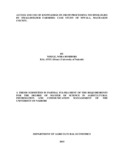| dc.description.abstract | Many fruits are produced and consumed in Kenya. They are eaten either fresh or in processed form. Processing is commonly by formal industry. The Government of Kenya strategy on reducing post-harvest losses to promote economic development, reduce poverty and increase food security is to support farmers to transition from subsistence to commercial. To support fruit farmers, processing and preservation technologies are being transferred through training. However, the training provided is not wide-spread and is undertaken by multiple agencies with variations in the training content and approach. This study was designed to assess the access and use of knowledge on fruit processing technologies with particular reference to Mangifera indica and Syzygium cuminii. The study was conducted as a case study in Mwala, Machakos County, Kenya. A literature review was undertaken on the processing technologies to identify the technologies that would be appropriate for the farmers. The farmers were randomly selected in a systematic way from 21 trained groups to obtain a sample size of 100 farmers. Data was collected using a pre-tested interview schedule on the socio-demographic and socio-economic characteristics of the farmers, their level of knowledge and on the use of processing technologies, training activities carried and knowledge sources on fruit processing technologies. Data was analysed using descriptive analysis and Multinomial logit (MNL) model. The study established that various technologies exist that are appropriate to exotic and indigenous fruits; they include pulping for beverage production and the manufacture of jams and jellies, drying, fermentation into wine, pickling, production of emulsions and production of vinegar. Out of the 100 trained respondents only 77% could remember and list the fruit processing technologies they had been trained on. Seventy-five-percent of the respondents have used processing technologies at least once for jam and juice manufacture. Use of fruit value adding/processing technologies was most common for home use (63%), with only 12% indicating processing for sale. Twenty- five-
xiii
percent indicated not having used the technologies that they had been trained on. Out of the 75 respondents, only six respondents were active adopters of the technologies at the time of the interview while 69 respondents were no longer practising at the time of the study. The fruit species most commonly used for the value addition/processing technologies training was Mangifera indica. It was established that processing for home consumption and for sale was significantly influenced by the number of trainings attended, number of technologies trained on, hands-on experience and own fruits production.
The study established that 51% of the respondents have been trained on juice making, followed by 21% on jam making and 11% on drying technologies. Very limited training had taken place with the use of the indigenous fruit, Syzygium cuminii (or any other indigenous fruits). The Ministry of Agriculture Livestock & Fisheries (MOALF) had trained the largest number of the interviewed respondents. In addition to training as a source of knowledge on processing, respondents indicated other sources of knowledge including radio (55%), formal and informal groups doing processing (18%), farmer’s field days and agricultural shows (11%), extension officers (9%) and friends and neighbours (7%). Challenges encountered in the use of the technologies included seasonality of the fruits, high cost of packaging materials, lack of processing equipment and lack of skills. The study concludes that the farmers have ample knowledge on fruit processing particularly from training but the practice is low. | en_US |



